Business Law BMP4002: UK Legal System, Courts, Legislation & Impact
VerifiedAdded on 2023/06/17
|7
|2400
|161
Report
AI Summary
This report provides a comprehensive overview of the legal system in the United Kingdom, focusing on its classifications of law, including civil and criminal law, and the roles of different courts such as the High Court and Supreme Court. It explains the sources of law, with emphasis on statute and case law, and details the process of making legislation, including delegated legislation. The report also analyzes the impact of UK law on commercial organizations, particularly in the context of employment law, covering statutory duties of employers and actions related to wrongful and unfair dismissal. The aim is to provide a thorough understanding of the UK legal framework and its practical implications for businesses. Desklib provides this and many more solved assignments for students.
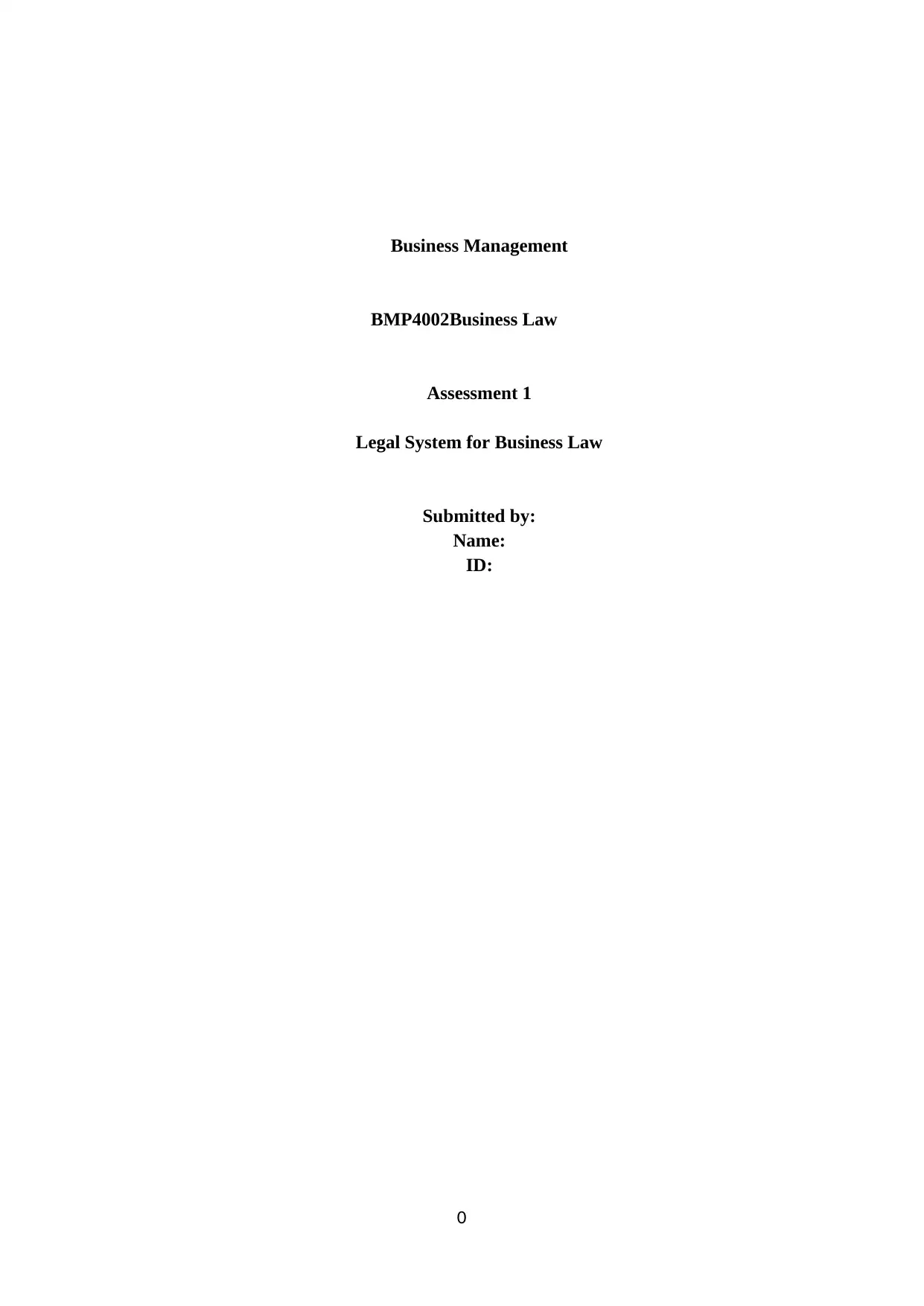
Business Management
BMP4002Business Law
Assessment 1
Legal System for Business Law
Submitted by:
Name:
ID:
0
BMP4002Business Law
Assessment 1
Legal System for Business Law
Submitted by:
Name:
ID:
0
Paraphrase This Document
Need a fresh take? Get an instant paraphrase of this document with our AI Paraphraser
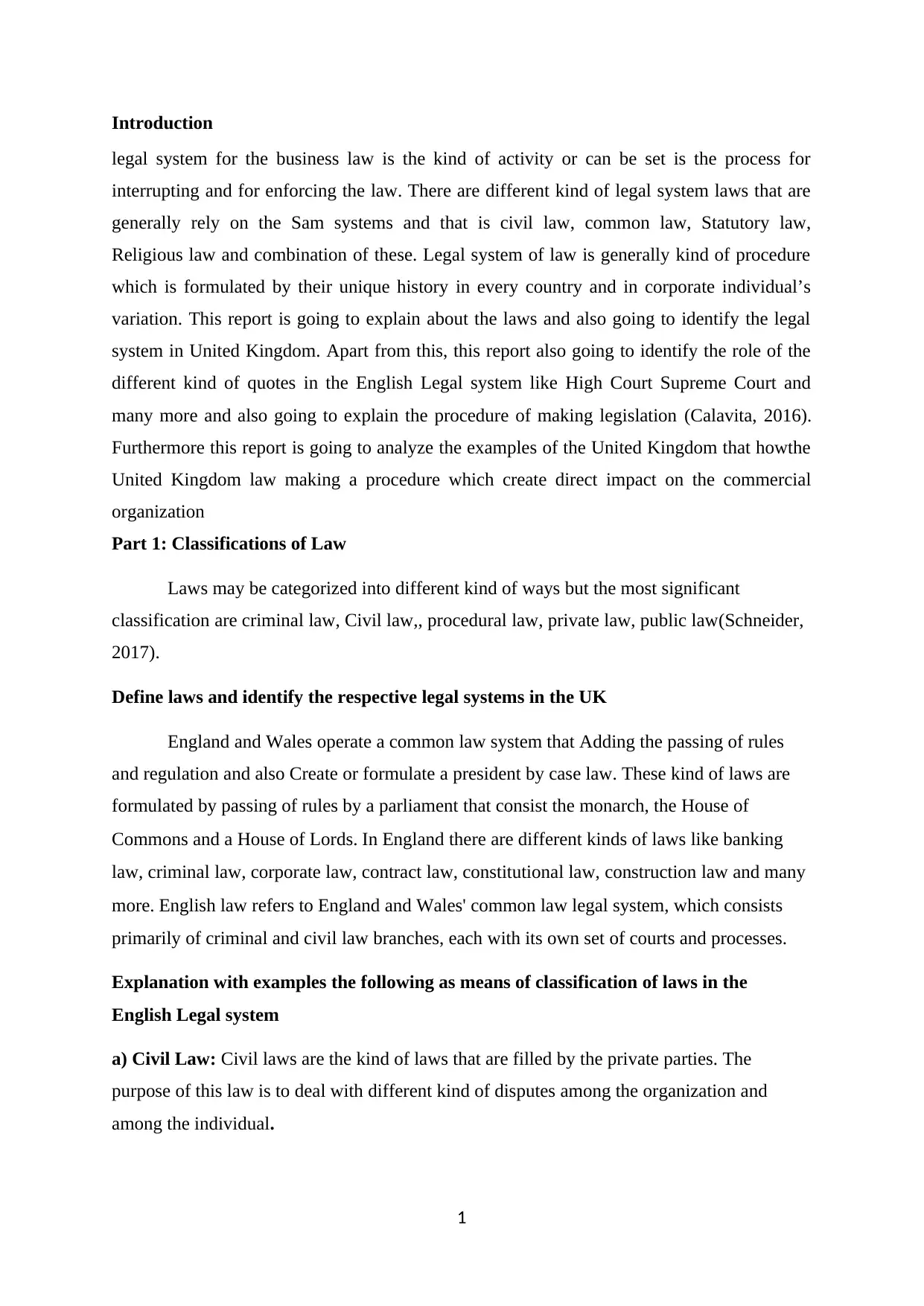
Introduction
legal system for the business law is the kind of activity or can be set is the process for
interrupting and for enforcing the law. There are different kind of legal system laws that are
generally rely on the Sam systems and that is civil law, common law, Statutory law,
Religious law and combination of these. Legal system of law is generally kind of procedure
which is formulated by their unique history in every country and in corporate individual’s
variation. This report is going to explain about the laws and also going to identify the legal
system in United Kingdom. Apart from this, this report also going to identify the role of the
different kind of quotes in the English Legal system like High Court Supreme Court and
many more and also going to explain the procedure of making legislation (Calavita, 2016).
Furthermore this report is going to analyze the examples of the United Kingdom that howthe
United Kingdom law making a procedure which create direct impact on the commercial
organization
Part 1: Classifications of Law
Laws may be categorized into different kind of ways but the most significant
classification are criminal law, Civil law,, procedural law, private law, public law(Schneider,
2017).
Define laws and identify the respective legal systems in the UK
England and Wales operate a common law system that Adding the passing of rules
and regulation and also Create or formulate a president by case law. These kind of laws are
formulated by passing of rules by a parliament that consist the monarch, the House of
Commons and a House of Lords. In England there are different kinds of laws like banking
law, criminal law, corporate law, contract law, constitutional law, construction law and many
more. English law refers to England and Wales' common law legal system, which consists
primarily of criminal and civil law branches, each with its own set of courts and processes.
Explanation with examples the following as means of classification of laws in the
English Legal system
a) Civil Law: Civil laws are the kind of laws that are filled by the private parties. The
purpose of this law is to deal with different kind of disputes among the organization and
among the individual.
1
legal system for the business law is the kind of activity or can be set is the process for
interrupting and for enforcing the law. There are different kind of legal system laws that are
generally rely on the Sam systems and that is civil law, common law, Statutory law,
Religious law and combination of these. Legal system of law is generally kind of procedure
which is formulated by their unique history in every country and in corporate individual’s
variation. This report is going to explain about the laws and also going to identify the legal
system in United Kingdom. Apart from this, this report also going to identify the role of the
different kind of quotes in the English Legal system like High Court Supreme Court and
many more and also going to explain the procedure of making legislation (Calavita, 2016).
Furthermore this report is going to analyze the examples of the United Kingdom that howthe
United Kingdom law making a procedure which create direct impact on the commercial
organization
Part 1: Classifications of Law
Laws may be categorized into different kind of ways but the most significant
classification are criminal law, Civil law,, procedural law, private law, public law(Schneider,
2017).
Define laws and identify the respective legal systems in the UK
England and Wales operate a common law system that Adding the passing of rules
and regulation and also Create or formulate a president by case law. These kind of laws are
formulated by passing of rules by a parliament that consist the monarch, the House of
Commons and a House of Lords. In England there are different kinds of laws like banking
law, criminal law, corporate law, contract law, constitutional law, construction law and many
more. English law refers to England and Wales' common law legal system, which consists
primarily of criminal and civil law branches, each with its own set of courts and processes.
Explanation with examples the following as means of classification of laws in the
English Legal system
a) Civil Law: Civil laws are the kind of laws that are filled by the private parties. The
purpose of this law is to deal with different kind of disputes among the organization and
among the individual.
1
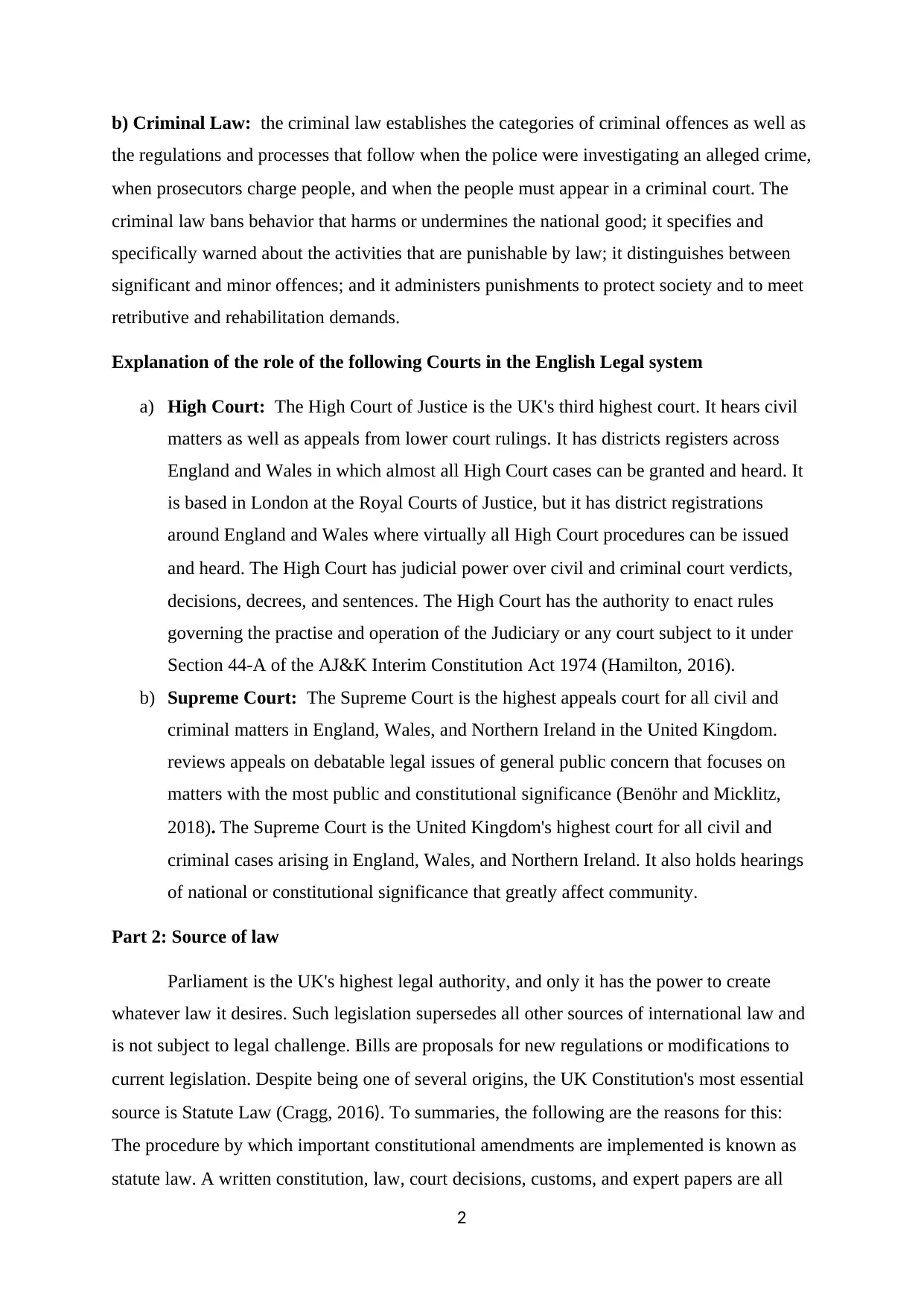
b) Criminal Law: the criminal law establishes the categories of criminal offences as well as
the regulations and processes that follow when the police were investigating an alleged crime,
when prosecutors charge people, and when the people must appear in a criminal court. The
criminal law bans behavior that harms or undermines the national good; it specifies and
specifically warned about the activities that are punishable by law; it distinguishes between
significant and minor offences; and it administers punishments to protect society and to meet
retributive and rehabilitation demands.
Explanation of the role of the following Courts in the English Legal system
a) High Court: The High Court of Justice is the UK's third highest court. It hears civil
matters as well as appeals from lower court rulings. It has districts registers across
England and Wales in which almost all High Court cases can be granted and heard. It
is based in London at the Royal Courts of Justice, but it has district registrations
around England and Wales where virtually all High Court procedures can be issued
and heard. The High Court has judicial power over civil and criminal court verdicts,
decisions, decrees, and sentences. The High Court has the authority to enact rules
governing the practise and operation of the Judiciary or any court subject to it under
Section 44-A of the AJ&K Interim Constitution Act 1974 (Hamilton, 2016).
b) Supreme Court: The Supreme Court is the highest appeals court for all civil and
criminal matters in England, Wales, and Northern Ireland in the United Kingdom.
reviews appeals on debatable legal issues of general public concern that focuses on
matters with the most public and constitutional significance (Benöhr and Micklitz,
2018). The Supreme Court is the United Kingdom's highest court for all civil and
criminal cases arising in England, Wales, and Northern Ireland. It also holds hearings
of national or constitutional significance that greatly affect community.
Part 2: Source of law
Parliament is the UK's highest legal authority, and only it has the power to create
whatever law it desires. Such legislation supersedes all other sources of international law and
is not subject to legal challenge. Bills are proposals for new regulations or modifications to
current legislation. Despite being one of several origins, the UK Constitution's most essential
source is Statute Law (Cragg, 2016). To summaries, the following are the reasons for this:
The procedure by which important constitutional amendments are implemented is known as
statute law. A written constitution, law, court decisions, customs, and expert papers are all
2
the regulations and processes that follow when the police were investigating an alleged crime,
when prosecutors charge people, and when the people must appear in a criminal court. The
criminal law bans behavior that harms or undermines the national good; it specifies and
specifically warned about the activities that are punishable by law; it distinguishes between
significant and minor offences; and it administers punishments to protect society and to meet
retributive and rehabilitation demands.
Explanation of the role of the following Courts in the English Legal system
a) High Court: The High Court of Justice is the UK's third highest court. It hears civil
matters as well as appeals from lower court rulings. It has districts registers across
England and Wales in which almost all High Court cases can be granted and heard. It
is based in London at the Royal Courts of Justice, but it has district registrations
around England and Wales where virtually all High Court procedures can be issued
and heard. The High Court has judicial power over civil and criminal court verdicts,
decisions, decrees, and sentences. The High Court has the authority to enact rules
governing the practise and operation of the Judiciary or any court subject to it under
Section 44-A of the AJ&K Interim Constitution Act 1974 (Hamilton, 2016).
b) Supreme Court: The Supreme Court is the highest appeals court for all civil and
criminal matters in England, Wales, and Northern Ireland in the United Kingdom.
reviews appeals on debatable legal issues of general public concern that focuses on
matters with the most public and constitutional significance (Benöhr and Micklitz,
2018). The Supreme Court is the United Kingdom's highest court for all civil and
criminal cases arising in England, Wales, and Northern Ireland. It also holds hearings
of national or constitutional significance that greatly affect community.
Part 2: Source of law
Parliament is the UK's highest legal authority, and only it has the power to create
whatever law it desires. Such legislation supersedes all other sources of international law and
is not subject to legal challenge. Bills are proposals for new regulations or modifications to
current legislation. Despite being one of several origins, the UK Constitution's most essential
source is Statute Law (Cragg, 2016). To summaries, the following are the reasons for this:
The procedure by which important constitutional amendments are implemented is known as
statute law. A written constitution, law, court decisions, customs, and expert papers are all
2
⊘ This is a preview!⊘
Do you want full access?
Subscribe today to unlock all pages.

Trusted by 1+ million students worldwide
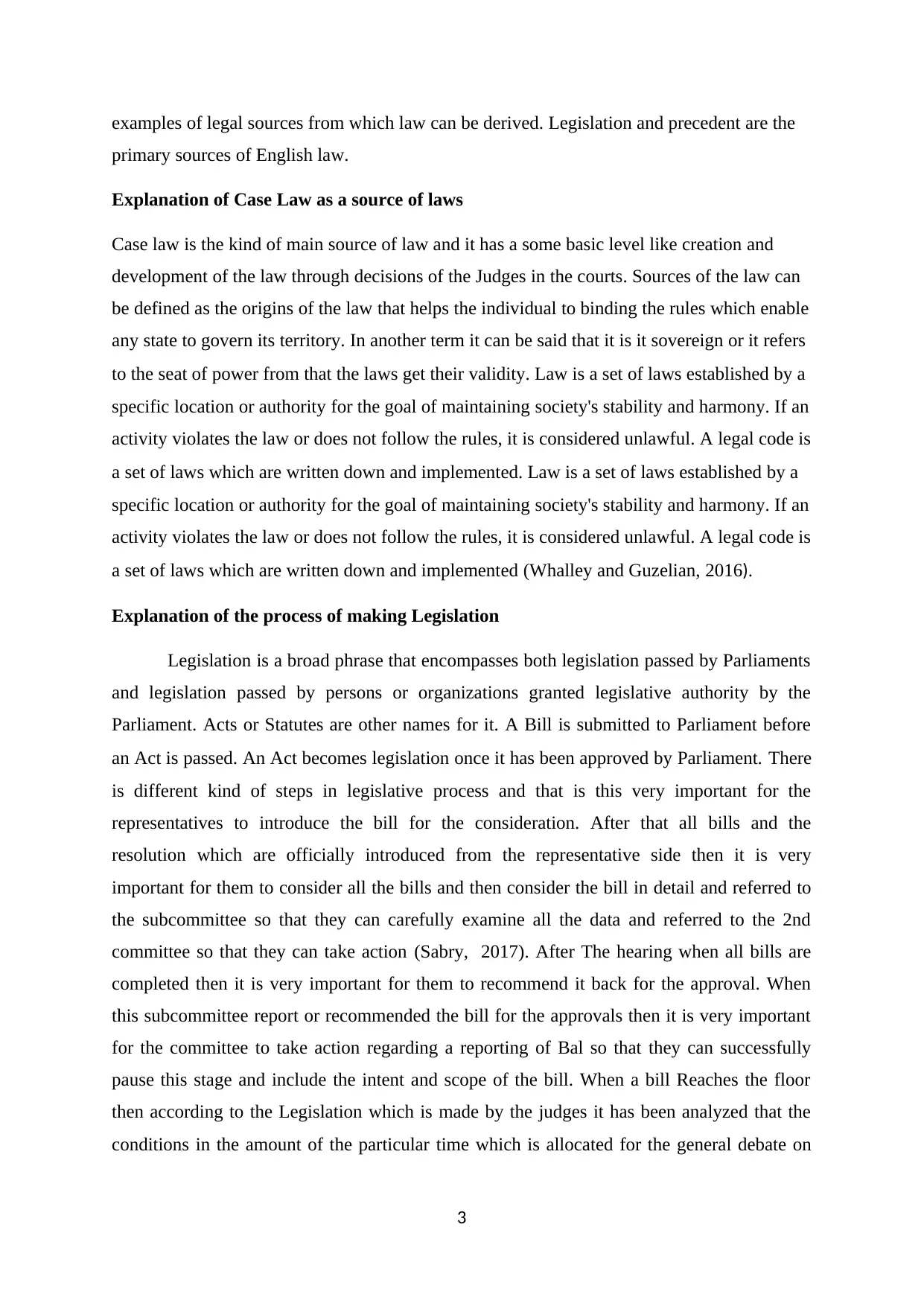
examples of legal sources from which law can be derived. Legislation and precedent are the
primary sources of English law.
Explanation of Case Law as a source of laws
Case law is the kind of main source of law and it has a some basic level like creation and
development of the law through decisions of the Judges in the courts. Sources of the law can
be defined as the origins of the law that helps the individual to binding the rules which enable
any state to govern its territory. In another term it can be said that it is it sovereign or it refers
to the seat of power from that the laws get their validity. Law is a set of laws established by a
specific location or authority for the goal of maintaining society's stability and harmony. If an
activity violates the law or does not follow the rules, it is considered unlawful. A legal code is
a set of laws which are written down and implemented. Law is a set of laws established by a
specific location or authority for the goal of maintaining society's stability and harmony. If an
activity violates the law or does not follow the rules, it is considered unlawful. A legal code is
a set of laws which are written down and implemented (Whalley and Guzelian, 2016).
Explanation of the process of making Legislation
Legislation is a broad phrase that encompasses both legislation passed by Parliaments
and legislation passed by persons or organizations granted legislative authority by the
Parliament. Acts or Statutes are other names for it. A Bill is submitted to Parliament before
an Act is passed. An Act becomes legislation once it has been approved by Parliament. There
is different kind of steps in legislative process and that is this very important for the
representatives to introduce the bill for the consideration. After that all bills and the
resolution which are officially introduced from the representative side then it is very
important for them to consider all the bills and then consider the bill in detail and referred to
the subcommittee so that they can carefully examine all the data and referred to the 2nd
committee so that they can take action (Sabry, 2017). After The hearing when all bills are
completed then it is very important for them to recommend it back for the approval. When
this subcommittee report or recommended the bill for the approvals then it is very important
for the committee to take action regarding a reporting of Bal so that they can successfully
pause this stage and include the intent and scope of the bill. When a bill Reaches the floor
then according to the Legislation which is made by the judges it has been analyzed that the
conditions in the amount of the particular time which is allocated for the general debate on
3
primary sources of English law.
Explanation of Case Law as a source of laws
Case law is the kind of main source of law and it has a some basic level like creation and
development of the law through decisions of the Judges in the courts. Sources of the law can
be defined as the origins of the law that helps the individual to binding the rules which enable
any state to govern its territory. In another term it can be said that it is it sovereign or it refers
to the seat of power from that the laws get their validity. Law is a set of laws established by a
specific location or authority for the goal of maintaining society's stability and harmony. If an
activity violates the law or does not follow the rules, it is considered unlawful. A legal code is
a set of laws which are written down and implemented. Law is a set of laws established by a
specific location or authority for the goal of maintaining society's stability and harmony. If an
activity violates the law or does not follow the rules, it is considered unlawful. A legal code is
a set of laws which are written down and implemented (Whalley and Guzelian, 2016).
Explanation of the process of making Legislation
Legislation is a broad phrase that encompasses both legislation passed by Parliaments
and legislation passed by persons or organizations granted legislative authority by the
Parliament. Acts or Statutes are other names for it. A Bill is submitted to Parliament before
an Act is passed. An Act becomes legislation once it has been approved by Parliament. There
is different kind of steps in legislative process and that is this very important for the
representatives to introduce the bill for the consideration. After that all bills and the
resolution which are officially introduced from the representative side then it is very
important for them to consider all the bills and then consider the bill in detail and referred to
the subcommittee so that they can carefully examine all the data and referred to the 2nd
committee so that they can take action (Sabry, 2017). After The hearing when all bills are
completed then it is very important for them to recommend it back for the approval. When
this subcommittee report or recommended the bill for the approvals then it is very important
for the committee to take action regarding a reporting of Bal so that they can successfully
pause this stage and include the intent and scope of the bill. When a bill Reaches the floor
then according to the Legislation which is made by the judges it has been analyzed that the
conditions in the amount of the particular time which is allocated for the general debate on
3
Paraphrase This Document
Need a fresh take? Get an instant paraphrase of this document with our AI Paraphraser
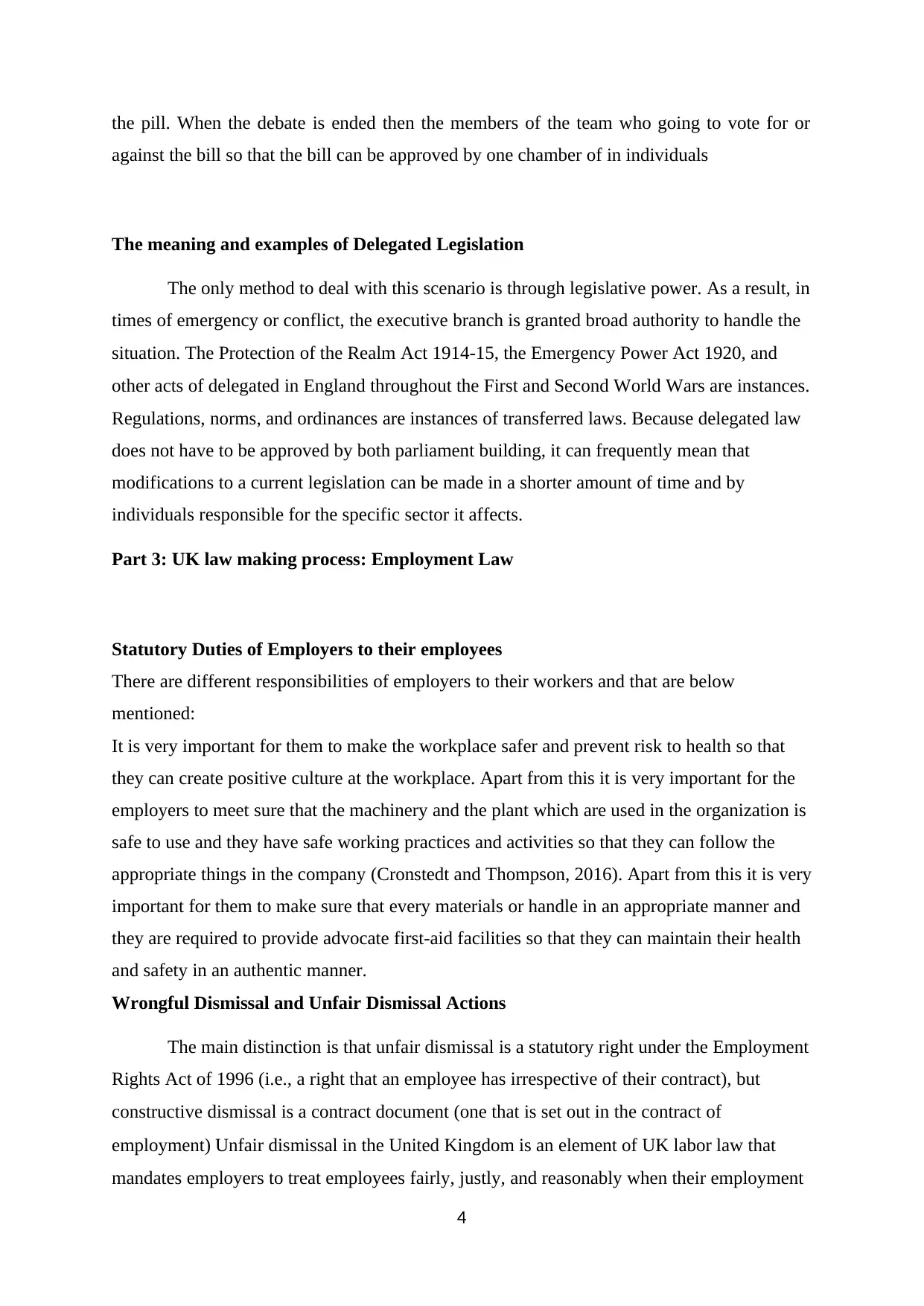
the pill. When the debate is ended then the members of the team who going to vote for or
against the bill so that the bill can be approved by one chamber of in individuals
The meaning and examples of Delegated Legislation
The only method to deal with this scenario is through legislative power. As a result, in
times of emergency or conflict, the executive branch is granted broad authority to handle the
situation. The Protection of the Realm Act 1914-15, the Emergency Power Act 1920, and
other acts of delegated in England throughout the First and Second World Wars are instances.
Regulations, norms, and ordinances are instances of transferred laws. Because delegated law
does not have to be approved by both parliament building, it can frequently mean that
modifications to a current legislation can be made in a shorter amount of time and by
individuals responsible for the specific sector it affects.
Part 3: UK law making process: Employment Law
Statutory Duties of Employers to their employees
There are different responsibilities of employers to their workers and that are below
mentioned:
It is very important for them to make the workplace safer and prevent risk to health so that
they can create positive culture at the workplace. Apart from this it is very important for the
employers to meet sure that the machinery and the plant which are used in the organization is
safe to use and they have safe working practices and activities so that they can follow the
appropriate things in the company (Cronstedt and Thompson, 2016). Apart from this it is very
important for them to make sure that every materials or handle in an appropriate manner and
they are required to provide advocate first-aid facilities so that they can maintain their health
and safety in an authentic manner.
Wrongful Dismissal and Unfair Dismissal Actions
The main distinction is that unfair dismissal is a statutory right under the Employment
Rights Act of 1996 (i.e., a right that an employee has irrespective of their contract), but
constructive dismissal is a contract document (one that is set out in the contract of
employment) Unfair dismissal in the United Kingdom is an element of UK labor law that
mandates employers to treat employees fairly, justly, and reasonably when their employment
4
against the bill so that the bill can be approved by one chamber of in individuals
The meaning and examples of Delegated Legislation
The only method to deal with this scenario is through legislative power. As a result, in
times of emergency or conflict, the executive branch is granted broad authority to handle the
situation. The Protection of the Realm Act 1914-15, the Emergency Power Act 1920, and
other acts of delegated in England throughout the First and Second World Wars are instances.
Regulations, norms, and ordinances are instances of transferred laws. Because delegated law
does not have to be approved by both parliament building, it can frequently mean that
modifications to a current legislation can be made in a shorter amount of time and by
individuals responsible for the specific sector it affects.
Part 3: UK law making process: Employment Law
Statutory Duties of Employers to their employees
There are different responsibilities of employers to their workers and that are below
mentioned:
It is very important for them to make the workplace safer and prevent risk to health so that
they can create positive culture at the workplace. Apart from this it is very important for the
employers to meet sure that the machinery and the plant which are used in the organization is
safe to use and they have safe working practices and activities so that they can follow the
appropriate things in the company (Cronstedt and Thompson, 2016). Apart from this it is very
important for them to make sure that every materials or handle in an appropriate manner and
they are required to provide advocate first-aid facilities so that they can maintain their health
and safety in an authentic manner.
Wrongful Dismissal and Unfair Dismissal Actions
The main distinction is that unfair dismissal is a statutory right under the Employment
Rights Act of 1996 (i.e., a right that an employee has irrespective of their contract), but
constructive dismissal is a contract document (one that is set out in the contract of
employment) Unfair dismissal in the United Kingdom is an element of UK labor law that
mandates employers to treat employees fairly, justly, and reasonably when their employment
4
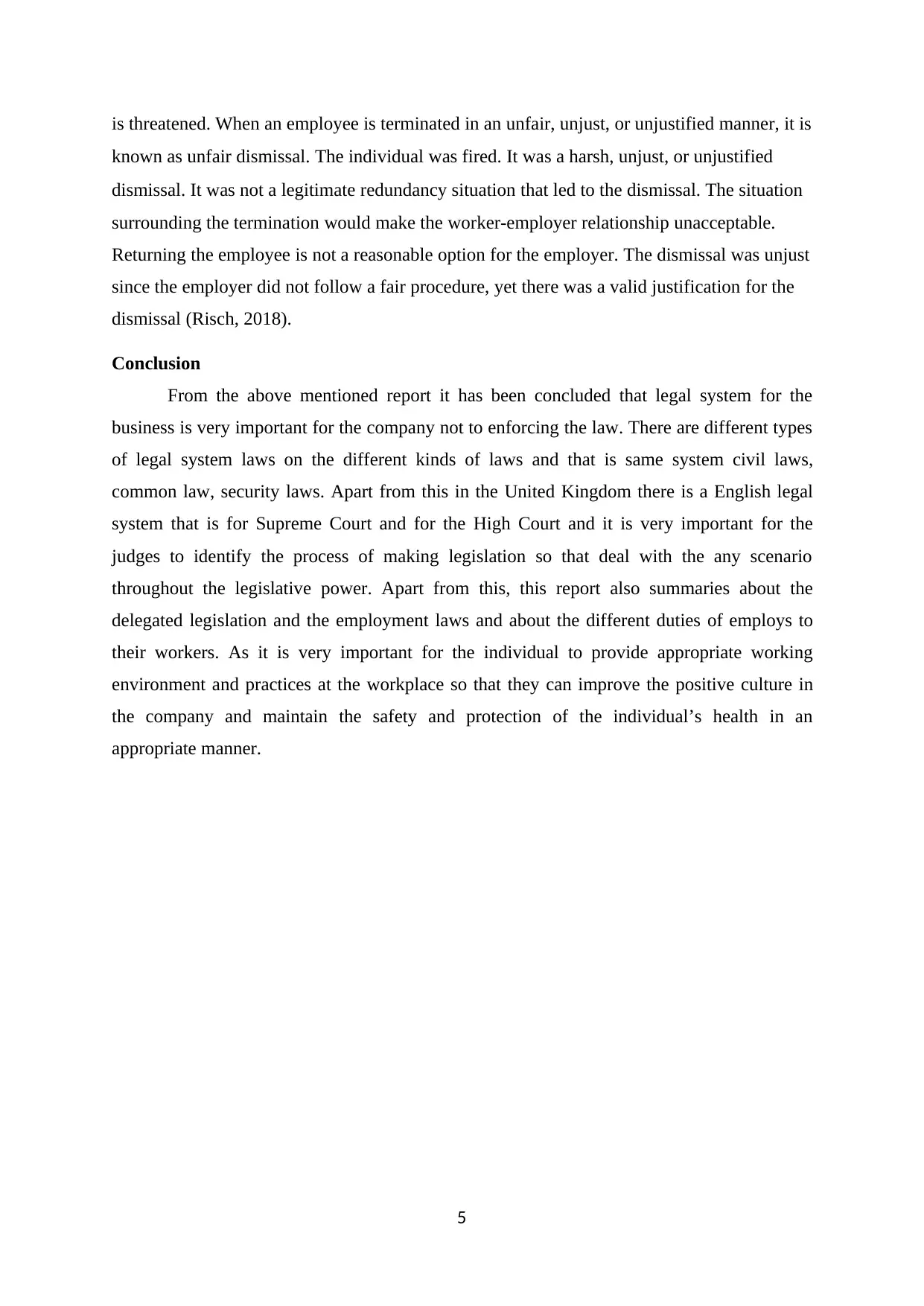
is threatened. When an employee is terminated in an unfair, unjust, or unjustified manner, it is
known as unfair dismissal. The individual was fired. It was a harsh, unjust, or unjustified
dismissal. It was not a legitimate redundancy situation that led to the dismissal. The situation
surrounding the termination would make the worker-employer relationship unacceptable.
Returning the employee is not a reasonable option for the employer. The dismissal was unjust
since the employer did not follow a fair procedure, yet there was a valid justification for the
dismissal (Risch, 2018).
Conclusion
From the above mentioned report it has been concluded that legal system for the
business is very important for the company not to enforcing the law. There are different types
of legal system laws on the different kinds of laws and that is same system civil laws,
common law, security laws. Apart from this in the United Kingdom there is a English legal
system that is for Supreme Court and for the High Court and it is very important for the
judges to identify the process of making legislation so that deal with the any scenario
throughout the legislative power. Apart from this, this report also summaries about the
delegated legislation and the employment laws and about the different duties of employs to
their workers. As it is very important for the individual to provide appropriate working
environment and practices at the workplace so that they can improve the positive culture in
the company and maintain the safety and protection of the individual’s health in an
appropriate manner.
5
known as unfair dismissal. The individual was fired. It was a harsh, unjust, or unjustified
dismissal. It was not a legitimate redundancy situation that led to the dismissal. The situation
surrounding the termination would make the worker-employer relationship unacceptable.
Returning the employee is not a reasonable option for the employer. The dismissal was unjust
since the employer did not follow a fair procedure, yet there was a valid justification for the
dismissal (Risch, 2018).
Conclusion
From the above mentioned report it has been concluded that legal system for the
business is very important for the company not to enforcing the law. There are different types
of legal system laws on the different kinds of laws and that is same system civil laws,
common law, security laws. Apart from this in the United Kingdom there is a English legal
system that is for Supreme Court and for the High Court and it is very important for the
judges to identify the process of making legislation so that deal with the any scenario
throughout the legislative power. Apart from this, this report also summaries about the
delegated legislation and the employment laws and about the different duties of employs to
their workers. As it is very important for the individual to provide appropriate working
environment and practices at the workplace so that they can improve the positive culture in
the company and maintain the safety and protection of the individual’s health in an
appropriate manner.
5
⊘ This is a preview!⊘
Do you want full access?
Subscribe today to unlock all pages.

Trusted by 1+ million students worldwide
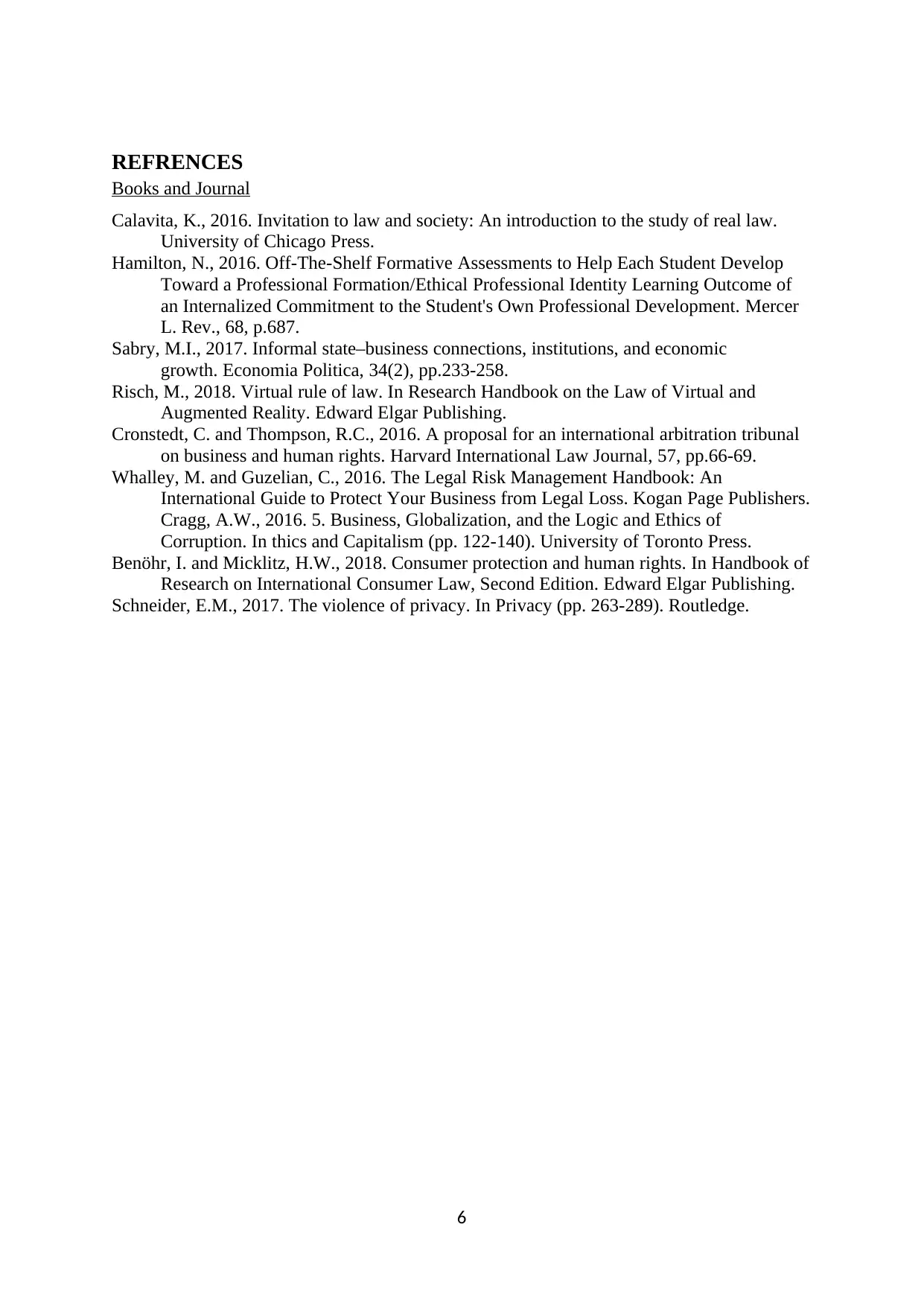
REFRENCES
Books and Journal
Calavita, K., 2016. Invitation to law and society: An introduction to the study of real law.
University of Chicago Press.
Hamilton, N., 2016. Off-The-Shelf Formative Assessments to Help Each Student Develop
Toward a Professional Formation/Ethical Professional Identity Learning Outcome of
an Internalized Commitment to the Student's Own Professional Development. Mercer
L. Rev., 68, p.687.
Sabry, M.I., 2017. Informal state–business connections, institutions, and economic
growth. Economia Politica, 34(2), pp.233-258.
Risch, M., 2018. Virtual rule of law. In Research Handbook on the Law of Virtual and
Augmented Reality. Edward Elgar Publishing.
Cronstedt, C. and Thompson, R.C., 2016. A proposal for an international arbitration tribunal
on business and human rights. Harvard International Law Journal, 57, pp.66-69.
Whalley, M. and Guzelian, C., 2016. The Legal Risk Management Handbook: An
International Guide to Protect Your Business from Legal Loss. Kogan Page Publishers.
Cragg, A.W., 2016. 5. Business, Globalization, and the Logic and Ethics of
Corruption. In thics and Capitalism (pp. 122-140). University of Toronto Press.
Benöhr, I. and Micklitz, H.W., 2018. Consumer protection and human rights. In Handbook of
Research on International Consumer Law, Second Edition. Edward Elgar Publishing.
Schneider, E.M., 2017. The violence of privacy. In Privacy (pp. 263-289). Routledge.
6
Books and Journal
Calavita, K., 2016. Invitation to law and society: An introduction to the study of real law.
University of Chicago Press.
Hamilton, N., 2016. Off-The-Shelf Formative Assessments to Help Each Student Develop
Toward a Professional Formation/Ethical Professional Identity Learning Outcome of
an Internalized Commitment to the Student's Own Professional Development. Mercer
L. Rev., 68, p.687.
Sabry, M.I., 2017. Informal state–business connections, institutions, and economic
growth. Economia Politica, 34(2), pp.233-258.
Risch, M., 2018. Virtual rule of law. In Research Handbook on the Law of Virtual and
Augmented Reality. Edward Elgar Publishing.
Cronstedt, C. and Thompson, R.C., 2016. A proposal for an international arbitration tribunal
on business and human rights. Harvard International Law Journal, 57, pp.66-69.
Whalley, M. and Guzelian, C., 2016. The Legal Risk Management Handbook: An
International Guide to Protect Your Business from Legal Loss. Kogan Page Publishers.
Cragg, A.W., 2016. 5. Business, Globalization, and the Logic and Ethics of
Corruption. In thics and Capitalism (pp. 122-140). University of Toronto Press.
Benöhr, I. and Micklitz, H.W., 2018. Consumer protection and human rights. In Handbook of
Research on International Consumer Law, Second Edition. Edward Elgar Publishing.
Schneider, E.M., 2017. The violence of privacy. In Privacy (pp. 263-289). Routledge.
6
1 out of 7
Related Documents
Your All-in-One AI-Powered Toolkit for Academic Success.
+13062052269
info@desklib.com
Available 24*7 on WhatsApp / Email
![[object Object]](/_next/static/media/star-bottom.7253800d.svg)
Unlock your academic potential
Copyright © 2020–2025 A2Z Services. All Rights Reserved. Developed and managed by ZUCOL.




